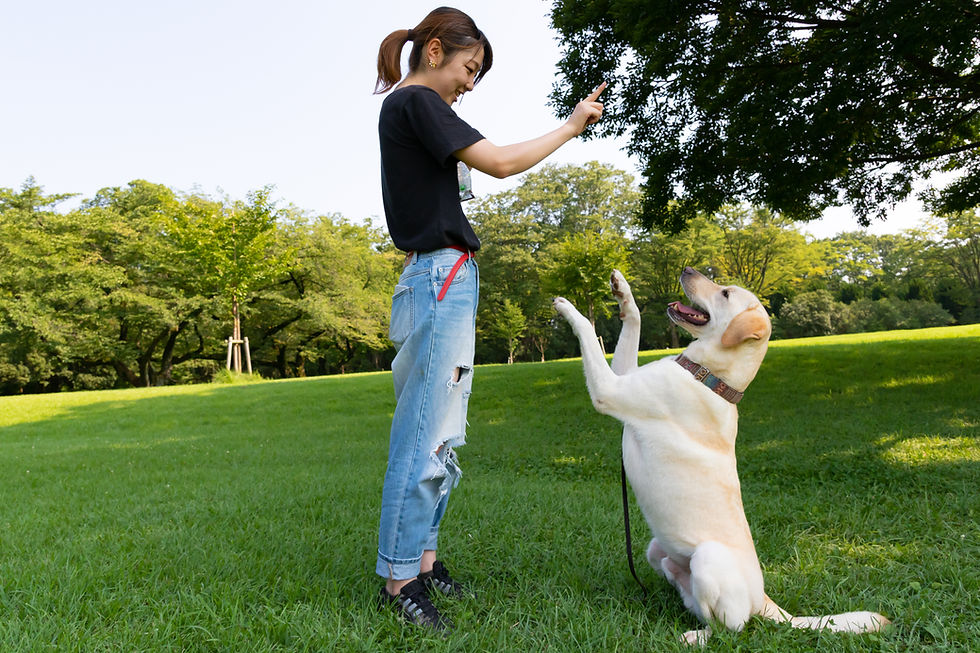I Got My Puppy at 6 Weeks Old...
- Awesome Dog Academy

- Nov 1, 2020
- 3 min read
Updated: May 17, 2021

As a dog trainer, I am often called by dog owners desperate for some help. Often, some puppy owners claim their puppies bite too hard or that their dogs are anti-social and suffer from dog aggression. A common reason I discover is that these puppies were removed too early from their litter, most often done by backyard breeders who only want to make a quick buck. At this age, a puppy may be able to eat solid foods but there is so much more that it ends up missing because the puppy leaves it's mother and siblings too soon.
Physically, puppies removed from their mothers even at 5 weeks or younger, exhibit appetite and weight loss, increased distress, higher mortality rates and higher susceptibility to disease.
Puppies learn a wide variety of behaviors during the ages of 3-8 weeks. They learn how to communicate with other dogs through body language, using their posture and tail to tell their siblings if they want to play, want to be left alone and everything in between. The mother dog teaches the puppy basic manners and she may discipline unacceptable behaviors by growling, snarling or snapping lightly. After a few corrections, puppies learn more acceptable behaviors, and afterwards, all it takes is the mother to give a mere glare to get a point across. When puppies fail to learn discipline from their mother, they can sometimes become more difficult to train.
Additionally, puppies learn bite inhibition through play. When a puppy bites too hard, the other puppy will yelp loudly, followed by withdrawal from play. The biting puppy then learns that in order for play to continue, they must watch how much pressure they use to bite. Failure to learn appropriate bite inhibition, will result in a puppy who does not measure its bite. This means that it can hurt another dog even if playing, and most of all, will definitely hurt a human's sensitive skin if the owner does not take measures to teach the puppy bite inhibition.
Puppies can also become too clingy to their new humans and have serious issues of separation anxiety when removed from their mothers during the transitional period. Fear created by early separation can create problems such as not eating and not sleeping properly. Puppies removed too early may also have a hard time tolerating frustration, because they never had to struggle over resources such as mom's milk, they aren't much used to not getting what they want and can't self-soothe.
It is essential that breeders start to understand the important role they have in bringing up the puppies. Breeders who understand the socialization and critical periods for puppies can make the difference between a new owner having an amazing dog and one that is going to be difficult for them. It will also make the breeder much more successful and desired if they can send puppies into the world that make fabulous dogs.
So....Now the question is, what can we do if our puppy was separated too young?
Do not fear, all is not lost! Owners can work to overcome the problems common with puppies who were separated too soon. Of course, we do not encourage owners to growl, snarl or snap at their puppies like a mother dog might. Humans know better and can use smarter strategies for helping their puppies become well rounded dogs.
Training classes can be beneficial in many ways. The puppy may learn that playing rough is unacceptable and, therefore may learn some basic canine etiquette practices. It is important to work on this now, that the puppy is small and not 80 pounds later, when the dog may turn into a liability.
Training is additionally important to strengthen the bond between puppy and owner, which can help you communicate with your dog so that they have a way to express themselves and be understood. In training classes, your dog will learn how to safely communicate with other dogs in an environment which can make it a positive experience. The socialization to a different location can additionally help your dog de-stress and learn how to be more comfortable in strange places.
Your puppy will require extra love and patience, but with consistency, positive training and care, they can become a happy family dog!
We recommend enrolling your puppy into our beginner obedience class to help prevent issues down the road. Check out our classes here



Comments